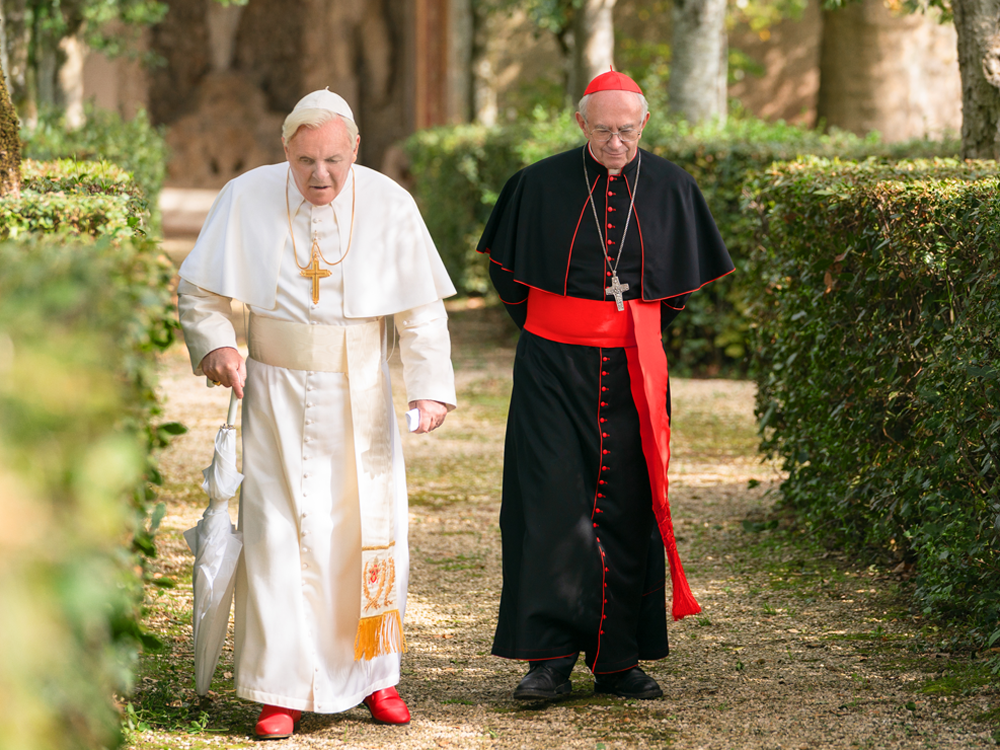The last time this happened was 1415. Pope Benedict, overseeing the Catholic Church during the period where all the abuse stories started coming to light, simply bowed to the pressure and resigned his papacy. Fernando Meirelles, fresh from the slums of Brazil, posits that Benedict resigned knowing that Pope Francis would be his successor. The Two Popes fictionalizes the two religious titans fraternizing with one another, and pontificating about the future of the Catholic Church. Or as I call it, Before Communion? Before Confession? I’m still workshopping the title.
Even though Benedict (Anthony Hopkins) summoned Cardinal Jorge Bergoglio (Jonathan Pryce) to Italy to speak, the soon to be Pope Francis wanted to come in person to resign as Cardinal in South America, hoping to do more good work as a parish priest locally. Benedict keeps putting off Jorge’s requests, instead confronting him on his past, and his belief in how to practice religion in the 21st Century. While Jorge might believe this is a stalling tactic on Benedict’s part, it’s clear by the movie’s halfway point that Benedict is testing Jorge for what might be a papal filled future coming sooner than Jorge suspects.
Much like the Before movies, The Two Popes is a two hander between Anthony Hopkins and Jonathan Pryce, both amazing in this film. At the beginning of the film, Benedict has his foot firmly planted in a Conservative, traditional mindset: he’s lived his whole life inside the papacy at the Vatican, now living alone in his gigantic, rich, but isolated summer home. He doesn’t understand Bergoglio, who lives very modestly in Argentina, surrounded by his parishioners and fellow football fans. Anthony McCarten’s script shows the equal footing these two men are on, quoting scripture and depths of knowledge about religious history to each other to help the other understand their point of view, and maybe perhaps test their beliefs and resolve. All these conversations are riveting: compromise vs. change, church customs vs. societal progress, strict vs. spiritual interpretation of the Bible, protecting the institution vs protecting the parishioners, living above or with sinners, etc. Benedict’s prying leads us to some flashbacks about Jorge’s past, giving him a complicated, mistake-filled, fascinating origin story for us to understand how he learned from his mistakes and grew into the Cardinal he is today. After hearing Bergoglio describe his past failures, Benedict then feels comfortable coming off his Papal high horse to confess his own shortcomings as Pope, connecting with his fellow human as a human himself. By bravely humanizing these titans of religion, The Two Popes makes it easy for audiences to connect with both men, and find many common parallels of conversations they’ve had with loved ones, friends, Facebook comments sections, etc.
Dense philosophical discussions can grow tiring after a while, which McCarten and Meirelles smartly suss out. They have to lighten things up for the audience a bit. So they key in on a key discussion the two popes talk about: Catholicism in the modern day. They rightly surmise: let’s have these two older supposedly enlightened humans interact with modern technology, social activity, etc. How does Jorge pass time waiting for Benedict to finish a church meeting? By going to a local pub and rooting for his favorite football team! The movie opens with Jorge trying to schedule a flight over the phone, and he doesn’t know the Vatican City’s postal code. Benedict’s even easier. Admiring a hymn Bergoglio is humming to himself, he asks what song it is, and Jorge replies “Dancing Queen.” Benedict’s so entrenched in the papacy he completely missed Beatlemania. The two even split a pizza and a couple beers watching a World Cup match between their home countries; I doubt this happened, but it’s a fun thought to here the two jabbing at each other over fouls by Lionel Messi or Thomas Muller. Again, while this is all amusing, it helps us relate to people who would otherwise seem unrelatable because of their job descriptions.
The great trick of The Two Popes is making us see Pope Benedict and Pope Francis as people more than religious entities. Because Anthony McCarten and Fernando Meirelles are so good at what they do, Jonathan Pryce and Anthony Hopkins give us a grounded match of ideas with literal religious implications by two flawed but real human beings. And I now want to see all powerful people struggling to use technology: Justin Trudeau’s emoji game, Jeff Bezos unable to project his Amazon Prime shows onto his TV, Vladimir Putin’s Tinder profile, etc.

